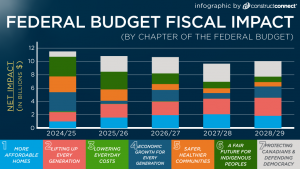TORONTO — Altus Group Limited in partnership with the Real Property Association of Canada (REALPAC) recently released the 2019 Canadian Property Tax Rate Benchmark Report, which provides an in-depth look at commercial and residential property tax rates in 11 major urban centres across Canada.
For over 16 years, Altus Group, a provider of software, data solutions and independent advisory services to the global commercial real estate industry, has conducted this report analyzing the differing tax ratios between commercial and residential properties.
The 2019 report found that eight of the 11 cities surveyed have a commercial rate which is at least double that of the residential tax rate, which means that a commercial property would incur property taxes more than twice the amount of an equally valued residential property.
This could have dramatic impacts on Canadian small businesses.
Montreal, Toronto and Vancouver posted the highest commercial-to-residential ratios in the country, for a twelfth consecutive year, indicates a release, adding Calgary and Montreal saw the highest ratio increases in 2019, indicating a growing burden on commercial rate payers in those cities.
The market-by-market trend analysis in the report found:
- Montreal’s commercial-to-residential tax ratio first rose above the average in 2008 and has been steadily climbing since, now sitting at 3.93, the highest of all of the cities surveyed.
- Toronto continues an 11-year trend of lowering commercial rates with a decrease of 5.29 per cent; however, it maintains the second highest commercial-to-residential tax ratio.
- For the first time in 20 years, Vancouver posted a commercial-to-residential tax ratio below 4:1, with a decrease of 17.17 per cent, the largest decline of all 11 cities surveyed. This is attributed to a decrease of 14.05 per cent in the commercial tax rate combined with a modest increase of 3.76 per cent in the residential tax rate.
- Quebec City’s commercial-to-residential tax ratio is the fourth highest of all cities surveyed. It has been steadily climbing for 15 years; however, it decreased by 3.75 per cent this year.
- For the second consecutive year, Calgary saw the largest ratio increase of all 11 cities at 8.31 per cent. Calgary also saw the largest increase in commercial tax rates for the fourth year in a row, jumping by 13.36 per cent in 2019, representing a 55 per cent overall increase in Calgary’s commercial tax rate over the last four years.
- Halifax’s commercial-to-residential tax ratio has remained relatively stable since 2006 but has slowly been increasing over the past few years. It now sits above the average for the first time in six years.
- Ottawa’s commercial-to-residential tax ratio of 2.51, sits just below the average ratio for the 10th consecutive year.
- Edmonton sits just below the average with a ratio of 2.41 and has remained relatively stable over the last four years.
- Although Winnipeg’s ratio has remained fairly stable for three years, it posted the highest 2019 residential rate at $12.33, an increase of 1.76 per cent from last year.
- Regina remains quite stable posting a 1.74 commercial-to-residential tax ratio, with only slight increases in both commercial and residential tax rates in 2019.
- Saskatoon continues to show the lowest commercial-to-residential tax ratio at 1.71, a slight decrease from last year.
Although each city is addressing this issue with their own unique approach, these solutions will compound the problem of inequities in commercial property taxes and create further disparities in commercial tax rates, the release states.
Assessment phase-ins and tax mitigation measures such as capping, rebate programs and graduated tax rates, only serve to compound the existing inequities in taxation and prolong the inevitable tax increases.
“Despite seeing some major shifts this year, the commercial-to-residential tax ratio is still an issue of relative fairness as we continue to see several cities across Canada shifting the burden of property taxes to business owners,” said Terry Bishop, president of Property Tax Canada at Altus Group, in a statement.
“Expecting businesses to shoulder the same burden while values decline, or taxes increase beyond business growth, is unsustainable. Measures that compress the gap between residential and commercial tax rates are positive steps that can help the viability of all businesses.”











Recent Comments
comments for this post are closed